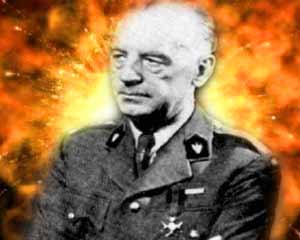01.07.2008
June 30, 2008 (the date of publication in Russian)
Grigory Tinsky
A MILITARY-HISTORICAL SCANDAL
Warsaw accuses London of assassination of Poland's Prime Minister
 One more political scandal, dating back to wartime history, has broken out in Poland. This time, suspicions fall upon the United Kingdom. On the occasion of the 65th anniversary of the death of Poland's Prime Minister Wladislaw Sikorski, the authors of an article published in Tygondik Powszechny, a Catholic magazine, insisted on exhumation of the General's remains, assuming that he could have been assassinated.
One more political scandal, dating back to wartime history, has broken out in Poland. This time, suspicions fall upon the United Kingdom. On the occasion of the 65th anniversary of the death of Poland's Prime Minister Wladislaw Sikorski, the authors of an article published in Tygondik Powszechny, a Catholic magazine, insisted on exhumation of the General's remains, assuming that he could have been assassinated.
Wladislaw Sikorski perished on July 4, 1943, in an air crash above the Mediterranean, minutes after his plane took off from Gibraltar. He had just arrived from Iran, where he supervised the contingent of Polish troops, commanded by General Wladislaw Anders. This general, captured by the Soviets in 1939, was released in 1941 and entrusted the task of building up the Polish Corps to fight under the Soviet command. However, Anders with a number of associates managed to escape the USSR along the Persian Corridor to Iran.
Afterwards, the self-established voluntary corps, known as the Anders Army, was redeployed by the British to Italy. Here, in January 1944, the Anders Army took part in capturing the Monte Cassino Abbey that was retained by the Nazi who prevented the British troops from entering Rome. Thousands of Poles were killed in this battle, and Monte Cassino became a pantheon of Polish military glory, commemorated in a popular song "Red Poppies on Monte Cassino".
Sikorski's death had since been in a shroud of mystery. The Poles suspected that the general was liquidated on Stalin's order. However, Tygodnik Powszechny raises a different version. It is noteworthy that the Warsaw Institute of People's Memory has got a special prosecutor's office for investigation of crimes against the Polish people.
According to the version, made public by historian Dariusz Baliszewski, the Prime Minister and Commander-in-Chief was assassinated in the palace of Gibraltar's Governor, his body later being mounted on the aircraft that was supposed to undergo a crash to conceal the crime. Other victims included Sofia, Sikorski's daughter; Taddeusz Klimecki, Head of Military Staff; and Andrzei Marecki, head of the Staff's Operative Division.
It is noteworthy that during the war, Girbaltar was a closed British military base, being a perfect place for a "pure English murder". The author suggests that the assassination was carried out by MI-5's Special Operation Executive. The intention was to change the configuration of military alliances in World War II.
In order to find out the true background of the death of Poland's leading military figures, the Warsaw Public Society of Historical Research addressed Cardinal Dzivisz of Krakow for permission to undertake exhumation of their bodies for a forensic expertise. It is noteworthy that Sikorski was originally buried in Britain, and only in 1993, his remains were transferred to Krakow, to the royal vault in the Wawel Castle, the site of Marshal Josef Pilsudski's grave.
Cardinal Dziwisz replied that such an important decision could be made only after consultations with the head of the state. Lech Kaczynski supported the idea, claiming that the tragic circumstances of General Sikorski's death are to be investigated, and exhumation could be helpful. "In any case, we should wait until truth is revealed", Kaczynski said.
What was the reason for the British to assassinate Sikorski? According to Baliszewski's view, the British believed that the General was steering Poland to a calamity, pushing the nation into Stalin's embrace. In fact, the Prime Minister’s death removed the Polish issue from the agenda of talks of great powers in the triangle of London, Washington and Moscow.
Could exhumation be technically useful for ascertaining the cause of death? In 1993, when Sikorski's remains were transferred to Wawel, historians insisted on a forensic expertise, as it was not conducted fifty years before. Dr. Tomasz Konopka, forensic specials from the Jagellonic University in Krakow, regrets that it was not performed. In case the general's death was a result of the air crash, typical bone fractures would serve as the evidence. However, traces of bullets would support the version of assassination. Thus, the British will now nervously wait for the results of the Polish expertise.
Number of shows: 1208
 ENG
ENG 

 ENG
ENG 
